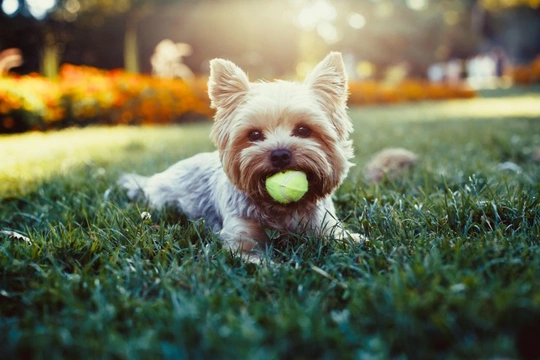
Is a Yorkshire terrier the right dog for you?
The Yorkshire terrier has always been one of the most popular small dog breeds in the UK, and as of March 2018, they’re our 13th most popular dog breed overall. One of the main appeals of dogs of the breed is their small size, which means that Yorkshire terriers are a good match for even the smallest of homes – but they are also intelligent, lively little dogs that will keep their owners on their toes.
If you are considering buying a Yorkshire terrier or are doing your research to narrow down your choices of the right dog breed to fit in with your lifestyle and living situation, it is important to find out as much as possible about the breed before committing to a purchase.
In this article we will look at the core traits and care requirements of the Yorkshire terrier in more detail, to help you to make an informed decision. Read on to learn more.
Yorkshire terrier sizes
The Yorkshire terrier is a small dog breed that falls within the Kennel Club’s toy grouping, but even though the breed is small by nature, there can be quite a lot of variance in the size of individual dogs across the breed as a whole.
The average Yorkshire terrier weighs between 1.8-3.2kg and stands between 20-22cm tall at the shoulder, but Yorkies smaller than this are not at all uncommon – dogs of the breed that weigh less than around 2kg are usually known as “teacup Yorkies,” and have an associated small size to match!
These very small Yorkshire terriers are often in great demand, but the breed as a whole is very popular with owners that like a small dog with a big personality.
Yorkshire terrier temperament
Yorkshire terriers are very loving and affectionate little dogs, but they are also often quite excitable and lively! As a dog of the terrier type they are inquisitive, mischievous and love to play, and will soon start looking for ways to entertain themselves if they get bored.
They can also be quite vocal – some would say yappy – and whilst this can be hard to manage in some cases, it also makes them good watchdogs who will soon let you know if someone is approaching the house or about to ring the doorbell.
They tend to be bold despite their small size, and will often happily play with much larger dogs in the dog park – although smaller specimens may be a little wary of huge dogs, given their respective vulnerability.
The Yorkshire terrier coat
Yorkshire terrier coats can grow very long – often down to the floor, with a large fringe over the eyes. The texture of their coats is referred to as hair rather than fur, and despite the lengths that their coats can reach they only shed minimally, so don’t leave clouds of hair around the home, which is a definite advantage.
However, these coats also need a lot of care and attention, with daily brushing and grooming to keep it in good condition and avoid knots and matting. Many Yorkshire terrier owners have their dogs clipped and trimmed every few weeks in a grooming parlour, to help to keep the dog’s coat care more manageable.
Yorkshire terrier exercise requirements
Yorkshire terriers are very lively, active dogs that need to have a couple of varied and interesting walks every day to keep them fit and mentally challenged. However, because of their small size, providing for this need is not usually overly onerous – and half an hour of exciting, varied exercise on and off the lead is usually enough to keep the dog happy.
Exercise is as important for the Yorkshire terrier as it is for any other breed – and if this need is not met, your dog is apt to become destructive, frustrated, and unhappy.
Yorkshire terrier health
The Yorkshire terrier breed as a whole tends to be quite long lived, with the average longevity across the breed ranging from 13-16 years. However, like all pedigree dog breeds, the Yorkie has a hereditary predisposition to a range of inherited health problems, and the Kennel Club and Yorkshire terrier breed clubs strongly advocate for health testing of parent stock for progressive retinal atrophy, primary lens luxation, and chiari malformation/syringomyelia.
Some dogs of the breed also tend to be prone to skin and coat problems, and so it is important to talk to the breeder of any dog you might be considering buying to find out about the health of their parents and other close relatives, and which health tests the dogs have undergone.
Living with a Yorkshire terrier
Yorkshire terriers are a good fit for people of all ages and most living situations, but they do need a lot of time and attention, and won’t thrive if left on their own all day. They tend to get on well with older children, but may find very young families challenging, which is something to bear in mind if you are planning to start a family or already have children under five.
They can also live happily with other pets providing that they are taught from a young age not to see smaller animals as prey, and that they can still get enough time and attention.
As a relatively intelligent breed, the Yorkshire terrier is usually fairly easy to train to basic commands, but the breed also has something of a reputation for being challenging to house train effectively, and so this may take longer than it might for other breeds.



